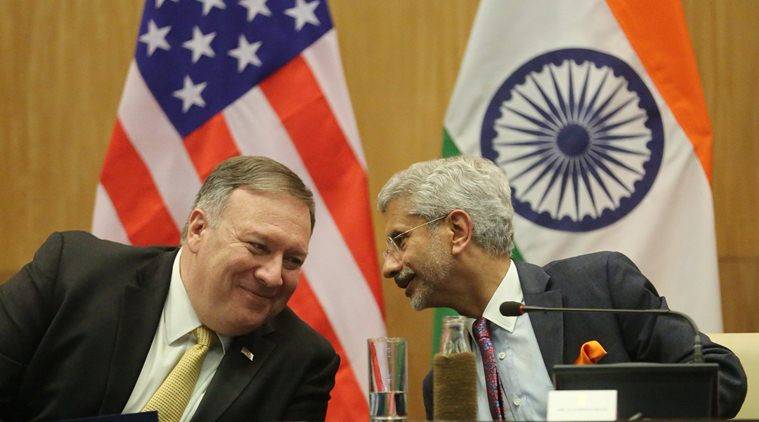 Though this is not linked to South Block’s coercive diplomacy, moves by these countries add up to a concerted pushback to Beijing.
Though this is not linked to South Block’s coercive diplomacy, moves by these countries add up to a concerted pushback to Beijing.
US Secretary of State Michael R Pompeo Wednesday welcomed India’s ban on Chinese mobile applications calling them “appendages of Communist Party of China’s surveillance state.” And Australian Prime Minister Scott Morrison unveiled Australia’s Defence Strategic Update in which he referred to the India-China stand-off.
From Australia to Japan, United States to Asean and countries in Europe, a loose strategic coalition is taking on China even as New Delhi tries to break the deadlock with Beijing amid the standoff along the Line of Actual Control.
Though this is not linked to South Block’s coercive diplomacy, moves by these countries add up to a concerted pushback to Beijing.
Pompeo, who was briefing reporters in Washington DC, said, “We welcome India’s ban on certain mobile apps that can serve as appendages of CCP’s surveillance state. India’s clean app approach will boost India’s sovereignty, will also boost India’s integrity and national security, as the Indian government itself has stated.”
Morrison Wednesday announced Australia’s 2020 Defence Strategic Update, a 270-billion Australian dollar 10-year defence plan which includes, for the first time, land, sea and air-based long-range and hypersonic strike missiles.
Significantly, the India-China standoff figures in its assessment. “Tensions over territorial claims are rising across the Indo-Pacific region, as we have seen recently on the disputed border between India and China, and the South China Sea, and the East China Sea. The risk of miscalculation and even conflict is heightening…Previous assumptions of enduring advantage and technological edge are no longer constants and cannot be relied upon. Coercive activities are rife,” Morrison said at the Update’s announcement.
This comes days after Australian Labor MP Shaoquett Moselmane, who praised China’s handling of the coronavirus crisis, was questioned by police who raided his home as part of a probe into whether Chinese agents have infiltrated his office.
On Tuesday, Japan delivered its toughest words to China on the issue of Hong Kong after Beijing reportedly passed a sweeping national security law for the city that Tokyo said would shake international faith in the “one-country, two-systems” principle.
Japan and China are also locked in a war of words over a Japanese move to change the administrative status of the Senkaku Islands, which China claims and refers to as the Diaoyu Islands.
Also, last week, India and Japan Navies conducted their 15th joint “goodwill training” exercise in the Indian Ocean.
The US Federal Communications Commission’s designation of Huawei Technologies Co. and ZTE Corp. as “national security threats,” is seen as tightening the screws on Chinese manufacturers. This is likely to have an impact on other countries, including India, which is yet to make up its mind on the 5G rollout.
Two US aircraft carriers kicked off joint exercises in the Philippine Sea Sunday, a week after Nimitz and another carrier, the USS Theodore Roosevelt conducted their own joint operations in the area. It is rare to see three US aircraft carriers operating at the same time in the Western Pacific and even more unusual to have separate dual-carrier exercises so close to each other.
On Saturday, the Association of Southeast Asian Nations (ASEAN) said, in a statement issued by Vietnam on behalf of the 10-nation bloc, that a 1982 U.N. oceans treaty should be the basis of sovereign rights and entitlements in the disputed waterway.
Europe, too, is waking up to the China challenge, with many leaders condemning Beijing’s move to press ahead with its new security laws in Hong Kong warning that it will speed up the reassessment of China as a trustworthy economic partner.
European Union Council president Charles Michel said “we deplore the decision” and the head of the European Commission, Ursula von der Leyen, said the bloc was discussing, with international partners, any possible measures in response.
The EU recently announced a new scheme meant to fight back against China’s use of state subsidies to give its firms an unfair advantage against European rivals. A long-planned investment screening mechanism meant to shield key European firms and industries from predatory acquisitions will finally be implemented, a move seen as an attempt to keep China in check.
New Delhi is watching these moves carefully, aware that how it conducts negotiations with China is also being watched worldwide, said a senior official. “That China’s peaceful rise is a myth has been reinforced through its aggressive behaviour in the last few months. More and more countries will push back,” he said.